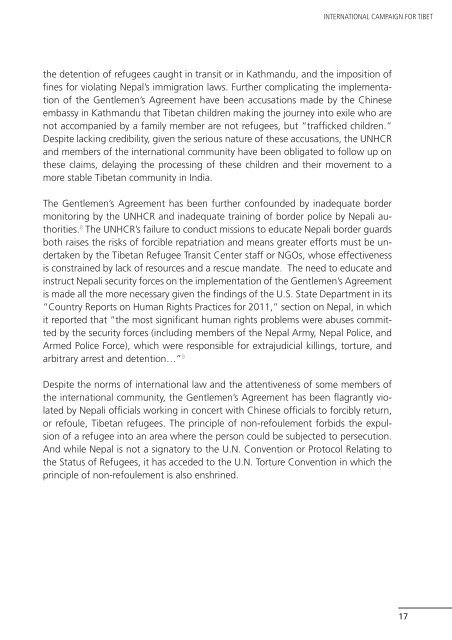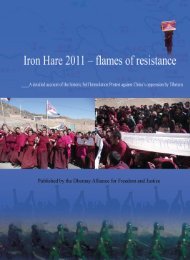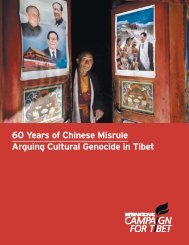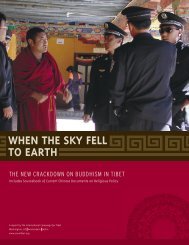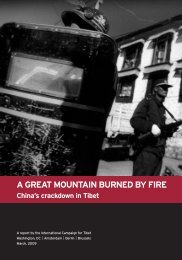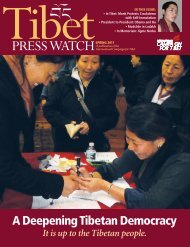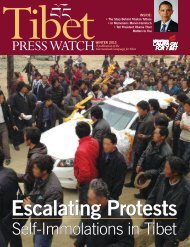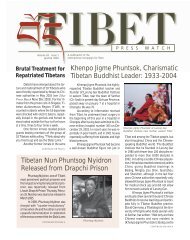DANGEROUS CROSSING: - International Campaign for Tibet
DANGEROUS CROSSING: - International Campaign for Tibet
DANGEROUS CROSSING: - International Campaign for Tibet
Create successful ePaper yourself
Turn your PDF publications into a flip-book with our unique Google optimized e-Paper software.
INTERNATIONAL CAMPAIGN FOR TIBET<br />
the detention of refugees caught in transit or in Kathmandu, and the imposition of<br />
fines <strong>for</strong> violating Nepal’s immigration laws. Further complicating the implementation<br />
of the Gentlemen’s Agreement have been accusations made by the Chinese<br />
embassy in Kathmandu that <strong>Tibet</strong>an children making the journey into exile who are<br />
not accompanied by a family member are not refugees, but “trafficked children.”<br />
Despite lacking credibility, given the serious nature of these accusations, the UNHCR<br />
and members of the international community have been obligated to follow up on<br />
these claims, delaying the processing of these children and their movement to a<br />
more stable <strong>Tibet</strong>an community in India.<br />
The Gentlemen’s Agreement has been further confounded by inadequate border<br />
monitoring by the UNHCR and inadequate training of border police by Nepali authorities.<br />
8 The UNHCR’s failure to conduct missions to educate Nepali border guards<br />
both raises the risks of <strong>for</strong>cible repatriation and means greater ef<strong>for</strong>ts must be undertaken<br />
by the <strong>Tibet</strong>an Refugee Transit Center staff or NGOs, whose effectiveness<br />
is constrained by lack of resources and a rescue mandate. The need to educate and<br />
instruct Nepali security <strong>for</strong>ces on the implementation of the Gentlemen’s Agreement<br />
is made all the more necessary given the findings of the U.S. State Department in its<br />
“Country Reports on Human Rights Practices <strong>for</strong> 2011,” section on Nepal, in which<br />
it reported that “the most significant human rights problems were abuses committed<br />
by the security <strong>for</strong>ces (including members of the Nepal Army, Nepal Police, and<br />
Armed Police Force), which were responsible <strong>for</strong> extrajudicial killings, torture, and<br />
arbitrary arrest and detention…” 9<br />
Despite the norms of international law and the attentiveness of some members of<br />
the international community, the Gentlemen’s Agreement has been flagrantly violated<br />
by Nepali officials working in concert with Chinese officials to <strong>for</strong>cibly return,<br />
or refoule, <strong>Tibet</strong>an refugees. The principle of non-refoulement <strong>for</strong>bids the expulsion<br />
of a refugee into an area where the person could be subjected to persecution.<br />
And while Nepal is not a signatory to the U.N. Convention or Protocol Relating to<br />
the Status of Refugees, it has acceded to the U.N. Torture Convention in which the<br />
principle of non-refoulement is also enshrined.<br />
17


